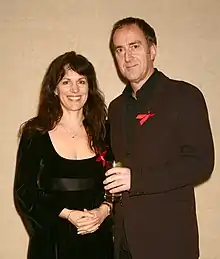The Luvvies
The Luvvies was an annual spoof awards ceremony that presented celebrities with awards that they "don't want".[1] The awards ran twice, with the first in February 2003, and the second in January 2004. Both ceremonies were hosted by the Scottish comedian Rhona Cameron.[2] They took place at Teddington Studios in London, and were broadcast on ITV1. Award categories included Love Rats, Naked Ambition and Ego of the Year;[3] each category had a shortlist of three celebrities. During the ceremony, the shortlist for each category was read out, along with some footage of each nominee to illustrate the reason for their inclusion.[3] The winner was then announced, followed by footage of him or her being doorstepped and presented with their trophy.[3] Some winners, such as Patsy Palmer and Edwina Currie, accepted their awards, while others, such as Boy George and David Blaine, did not. A few winners, such as Simon Cowell and Jordan, showed up at the ceremony to receive their trophy in person.
| The Luvvies | |
|---|---|
| The Awards the Stars Don't Want | |
 | |
| Country | United Kingdom |
| Hosted by | Rhona Cameron |
| First awarded | 2003 |
| Last awarded | 2004 |
| Most awards | Russell Crowe (2) |
| Television/radio coverage | |
| Network | ITV |
| Produced by | Dan Clapton James Breen |
| Directed by | Russell Norman Mike Toppin |
Critical reaction to The Luvvies was generally negative. Writing about the 2004 awards, Frances Traynor of the Daily Record summarised the ceremony as "the show viewers really don't want to watch" and noted that "even Rhona Cameron looked bored".[4] TV critic Charlie Brooker was particularly scathing, writing that the awards had "enraged" him and that "harassing the heartbroken for funnies is disgraceful".[5] Cameron argued that "the key to accepting a Luvvie is not to take yourself too seriously", and said that if she were presented with a Luvvie she would "welcome it with open arms – otherwise you might look a bit po-faced and silly".[3]
Awards



2003
| Naked Ambition | Love Rats |
|---|---|
| Most Likely to Turn Up for the Opening of an Envelope |
When Stars Attack |
| The Odd Couple | Worst Career Move |
| Frock Horror | Rent-a-Celeb |
| You're So Vain | Ego of the Year |
2004
| Romance | Catfight |
|---|---|
| You're So Vain | Attention Seeker |
| |
| Long Arm of the Law | Reality Star of the Year |
| Frock Horror | Love Rats |
| Naked Ambition | Lead Balloon |
| Nice Knowing You | Ego of the Year |
References
- Fulton, Rick (8 August 2003). "The rumble in the jungle that saved my career". Daily Record. Glasgow: Trinity Mirror. ISSN 0956-8069. OCLC 500344244. Archived from the original on 14 May 2018. Retrieved 12 September 2017.
- Sloan, Billy (30 March 2003). "Email Entertainment; Love is the drug for Ferry; Star finds happiness after divorce". Sunday Mail. Glasgow: Trinity Mirror. Retrieved 12 September 2017.
- "Won to be missed; The Luvvies: The Awards Stars Don't Want ITV, 9.30pm". Daily Record. Glasgow: Trinity Mirror. 15 February 2003. ISSN 0956-8069. OCLC 500344244. Retrieved 12 September 2017.
- Traynor, Frances (29 January 2004). "Frances Traynor: Did you see?". Daily Record. Glasgow: Trinity Mirror. ISSN 0956-8069. OCLC 500344244. Retrieved 12 September 2017.
- Brooker, Charlie (2009). "Part Four: 2003". Charlie Brooker's Screen Burn. London: Faber and Faber. pp. 229–30. ISBN 9780571250141. OCLC 978255661. Archived from the original on 14 May 2018. Retrieved 22 August 2017.